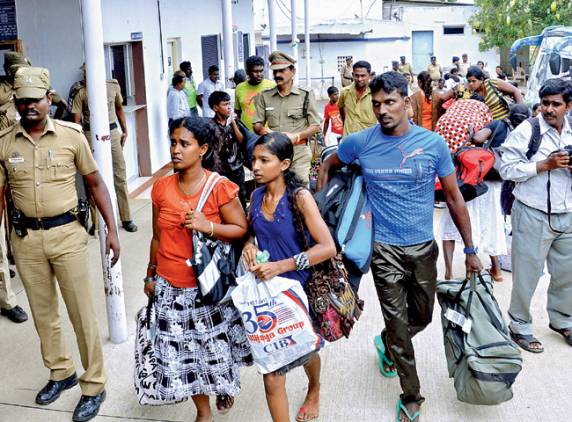
Chennai/Tirunelveli, September 5: With the pro-Tamil outfits attacking Sri Lankan pilgrims in the state, the DMK on Tuesday said it was only opposed to India’s training defence personnel from the island nation while the CPI(M) expressed concern over the hostility towards the visitors.
DMK president M. Karunanidhi said his party was strongly opposed to India’s training of defence personnel from Lanka, but was not averse to players’ visits.
“All that we can insist is there should be no military training to Sri Lankan personnel in India as the military was responsible for the death of civilian Tamils. That is why we are opposing the training for Lankan personnel and even stoutly opposing it in Parliament,” Mr Karunanidhi said in reply to a query on Lankan pilgrims being forced to leave for home after some local pro-Tamil outfits staged a protest against them near Thanjavur Monday.
When asked about his party’s stand on the state government sending back a Lankan football team, Mr Karunanidhi said it is usual for sportsmen, especially cricketers from the two nations, to travel to either country to play matches.
On Lankan President Mahinda Rajapaksa’s proposed India visit later this month on an official engagement, the DMK chief said, “It is not acceptable to us that he, responsible for the killing of lakhs of Tamils, is accorded a special welcome”, in India.
Expressing concern over “hostility” against Lankan visitors in the state, the CPI(M) said nothing should be done to disturb people-to-people relations whatever be the Lankan government’s approach towards the Tamils issue. It also appealed to the people and political forces in TN to ensure that friendly and harmonious relations are maintained with the people of Sri Lanka.
TN-Colombo trade may take a beating, fear southern dealers
Pro-Tamil outfits may be happy that Sri Lankan pilgrims have been driven back to their island nation, cutting short their trip to the state, but the trading community of the southern districts is afraid its traditional trade with Colombo through Thoothukudi could take a hit as a result.
Chairman of the Thoothukudi chapter of the Confederation of Indian industries (CII), Gunasingh Chelladurai, says the acts of some of the political and other outfits in Tamil Nadu against the visitors from Sri Lanka are bound to adversely affect its existing trade ties with the neighbouring nation. Around 15 boats currently operate between Thoothukudi and Colombo, carrying dry fish, construction material and beedi leaves for export to Colombo from small traders of the southern districts of Tirunelveli, Thoothukudi and Virudhunagar.
A boat operator, Danabalan says 50 years ago over 40 sailboats were engaged in the sea trade between Thoothukudi and Colombo, but the ethnic crisis in Sri Lanka dealt a severe blow to the trade and the boats stopped operating altogether during the final phase of the war between the Sri Lankan government and the LTTE in 2008, leaving 5000 sailors jobless.
The sailboat service however resumed on February 12, 2011 after the end of the ethnic war in the island nation, but now only 15 boats operate between the two countries, according to him. Danabalan fears that the attitude of the state government and other political parties to visiting Sri Lankans could prove the last straw for the traditional small sailboat service.
Responding to the fears of the boatmen, state secretariat member of CP1(M), K Kanagaraj says the state government is doing a great disservice to the Tamils by harassing Sri Lankan nationals visiting Tamil Nadu and warns it may provoke the common Singhalese against the community in Sri Lanka.





Comments
Add new comment